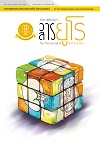Lifestyle modification improve quality of life and alleviate risk of renal stone formation in patients with kidney stone
Keywords:
urolithiasis, renal calculi, risk factors, quality of life, โรคนิ่วไต, ปัจจัยเสี่ยง, คุณภาพชีวิตAbstract
Objective: Kidney stone is multifactorial disease, many factors including environment, dietary and lifestyle behavior are involve in the development of calculi. Hematuria and flank pain are the presenting symptoms that suffer both health and mental status of affecting patients. In addition, the recurrence is frequent and could leads to chronic renal disease. Because of these, kidney stone patients had poor quality of life (QOL) and will not improve without the proper management. The purpose of this study was to examine the effect of lifestyle modification on quality of life and urolithiasis metabolic risk factors in kidney stone patientsMaterials and Methods: We established a urolithiasis care team; including urologists, nurses and nutritionists to provide the most suitable management for each patient. Sixty-five urolithiasis patients who received surgical treatment in Sunpasitprasong Hospital, Ubon Ratchathani Province, Thailand, were provided the appropriate advice including anti-lithogenic diet and lifestyle modification. The outcome was measured by the interview about QOL and the laboratory results of compositions in 24-hours urine at baseline and 6 months post-operatively.
Results: At 6 months, most of the patients accepted that they felt healthier than baseline, and improving in polyuria, nocturia, dysuria, hematuria and felt more comfortable to go outside without the urgent urination. In the aspect of diet pattern, subjects can manage to consume less salty and lithogenic food, including oxalate-and phosphate-rich diet food. High intake of water and fruits but intake high biological value of protein (0.8 g/kg/day) and limit red meats for kidney stone prevention. Urinary composition showed significantly lower level of oxalate and protein than baseline, while citrate, total antioxidant status (TAS) and pH were significantly increased. For uric acid, Ca, Na and urine volume slightly decreased but K and Mg slightly increased.
Conclusion: Our results support the use of urolithiasis care team approaching for urolithiasis management, including optimal follow-up, lifestyle changes and dietary counseling are the effective strategies to reduce the stone recurrence risks and increase the QOL of the patients.
การปรับเปลี่ยนการดำเนินชีวิตของผู้ป่วยโรคนิ่วไตเพื่อส่งเสริมคุณภาพชีวิตและลดปัจจัยเสี่ยงต่อการเกิดนิ่วซ้ำ
ดรุณี บุ้งทอง*, ทัศนีย์ กลิ่นหอม*, นิตยา เทศคำจร*, วัฒนชัย อึ้งเจริญวัฒนา*, ปิยะรัตน์ โตสุโขวงศ์**
*หน่วยศัลยศาสตร์ระบบทางเดินปัสสาวะ ภาควิชาศัลยศาสตร์ โรงพยาบาลสรรพสิทธิประสงค์
**ภาควิชาชีวเคมี คณะแพทยศาสตร์ จุฬาลงกรณ์มหาวิทยาลัย
บทคัดย่อ
วัตถุประสงค์: โรคนิ่วไตเกิดจากหลายปัจจัย เช่น สภาพแวดล้อม อาหาร และพฤติกรรมการดำเนินชีวิต อาการแสดงของผู้ป่วยประกอบด้วยความเจ็บปวดบริเวณเอวและปัสสาวะเป็นเลือด ทำให้ผู้ป่วยมีทั้งความทุกข์ทั้งทางกายและทางใจอีกทั้งโรคนิ่วไตเกิดซ้ำได้บ่อย และทำให้เกิดภาวะไตเสื่อมได้ ทำให้ผู้ป่วยยิ่งมีความทุกข์ทรมานเพิ่มขึ้นหากไม่ได้รับการดูแลรักษาที่เหมาะสม ดังนั้นทีมนักวิจัยมีเป้าหมายที่จะศึกษาผลของการปรับเปลี่ยนพฤติกรรมการดำเนินชีวิตต่อการเปลี่ยนแปลงของคุณภาพชีวิตและปัจจัยเสี่ยงทางเมทาบอลิกที่สำคัญของการเกิดนิ่วในผู้ป่วยโรคนิ่วไต
ผู้ป่วยและวิธีการศึกษา: ผู้วิจัยจัดตั้งทีมดูแลผู้ป่วยโรคนิ่วไต ประกอบด้วยศัลยแพทย์ระบบปัสสาวะ ทีมพยาบาลและนักโภชนาการ ในผู้ป่วยโรคนิ่วไตจำนวน 65 ราย อายุเฉลี่ย 46.74 ปี ที่เข้ารับการผ่าตัดเอานิ่วออกที่โรงพยาบาลสรรพสิทธิ์ประสงค์ จังหวัดอุบลราชธานี และประเมินผลอาศัยการสัมภาษณ์ถึงอาการต่าง ๆ คุณภาพชีวิต และตรวจวัดองค์ประกอบของปัสสาวะ 24 ชั่วโมง เปรียบเทียบที่ baseline และ 6 เดือนหลังการผ่าตัด
ผลการศึกษา: ผลจากการสัมภาษณ์พบว่า ที่ 6 เดือน ผู้ป่วยมีคุณภาพชีวิตที่ดีขึ้น โดยมีอาการปวดปัสสาวะบ่อยๆ การตื่นมาปัสสาวะเวลากลางคืน อาการปวดแสบเวลาปัสสาวะ และปัสสาวะเป็นเลือดลดลงอย่างชัดเจน รวมถึงคลายความกังวลเกี่ยวกับการปัสสาวะที่เป็นอุปสรรคต่อการเดินทางออกนอกบ้านด้วย รวมทั้งมั่นใจว่าโรคนิ่วไตไม่ส่งผลถึงกิจวัตรประจำวัน ในด้านการปรับเปลี่ยนพฤติกรรมการบริโภค พบว่า ผู้ป่วยเข้าใจและสามารถลดการบริโภคอาหารที่เพิ่มความเสี่ยงต่อการเกิดโรคนิ่ว เช่น อาหารรสเค็ม หรือมีออกซาเลตและฟอสเฟตสูง และเพิ่มพฤติกรรมที่ช่วยป้องกันการเกิดนิ่วเช่น การดื่มน้ำต่อวัน และผลไม้มากขึ้น บริโภคโปรตีนที่มีคุณภาพสูง (0.8 กรัม/กิโลกรัม/วัน) แต่ลดเนื้อแดง ผลการตรวจวัดองค์ประกอบของปัสสาวะพบว่า ระดับออกซาเลตและโปรตีนลดลงเมื่อเทียบกับ baseline อย่างมีนัยสำคัญ ในขณะที่ซิเตรท สารต้านอนุมูลอิสระรวม และค่าความเป็นกรด-ด่าง (pH) เพิ่มขึ้นอย่างมีนัยสำคัญ ส่วนค่ายูเรต แคลเซียม โซเดียม และปริมาตรปัสสาวะลดลง ขณะที่ค่าโพแทสเซียม และแมกนีเซียมเพิ่มขึ้นเล็กน้อย
สรุป: จากผลการศึกษาสนับสนุนว่าการดูแลรักษาผู้ป่วยโรคนิ่วไตอย่างต่อเนื่องโดยทีมแพทย์ การให้คำแนะนำการปรับเปลี่ยนพฤติกรรมเสี่ยงและการบริโภคอาหารที่ป้องกันการเกิดนิ่ว เป็นกลยุทธ์ที่สำคัญทำให้ปัจจัยเสี่ยงของการเกิดโรคนิ่วไตซ้ำลดลงและช่วยให้ผู้ป่วยโรคนิ่วไตมีคุณภาพชีวิตดีขึ้น
Downloads
Published
2013-12-31
How to Cite
Boongthong, D., Klinhom, T., Teskamjon, N., Ungchareonwattana, W., & Tosukhowong, P. (2013). Lifestyle modification improve quality of life and alleviate risk of renal stone formation in patients with kidney stone. Insight Urology, 34(2), 41–49. retrieved from https://he02.tci-thaijo.org/index.php/TJU/article/view/63144
Issue
Section
Original article



